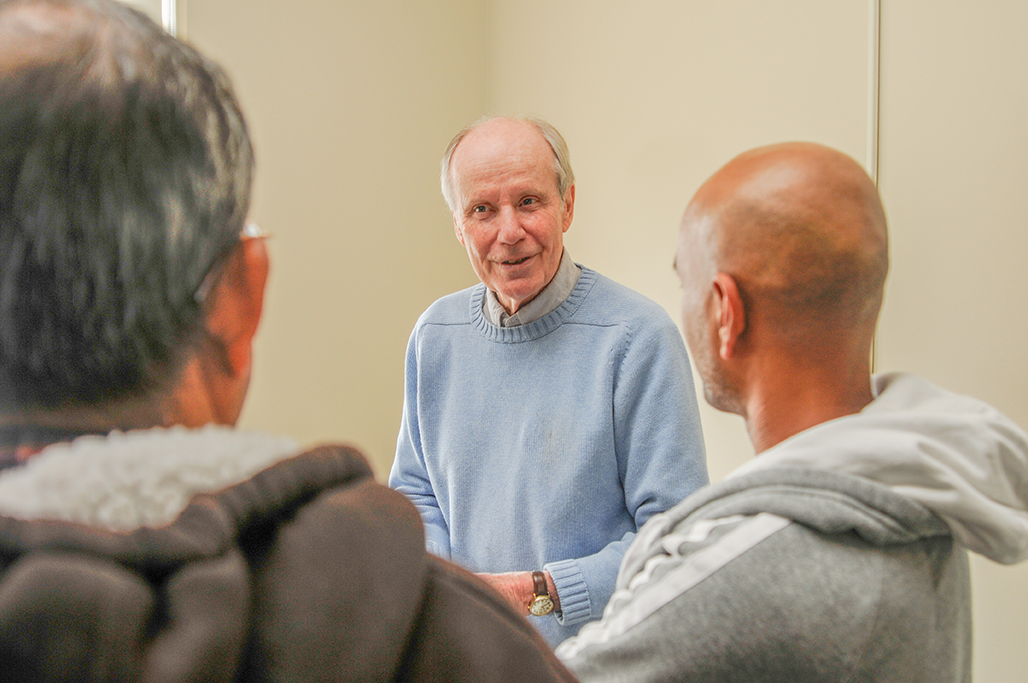In Memoriam
Dick Ford’s impact is felt around the world

Richard “Dick” Ford enjoyed telling the story of the letter that brought him to Clark.
The year was 1967, and Ford was doing what he loved best: enmeshing himself in the vibrant cultures, social rhythms, and political nuances of Africa. As a visiting professor at the University of Natal, he’d traveled to South Africa with his wife, Nancy, to continue his research when he received an unexpected letter in the mail. It was from Saul Cohen, the head of the Graduate School of Geography at Clark University, informing Ford that a teaching position was open and asking if he would be interested in applying.
Unmoved by the offer, Ford balled up the letter and tossed it into the wastebasket.
“I grew up in New York, and I’d never even heard of Worcester, never mind Clark,” he recalled in a 2011 interview. “That night, Nancy and I were going to dinner with an American couple. He was a Yale Ph.D. in African history, but it turns out he grew up in Worcester. I said, ‘Worcester? I just got a letter from somebody in Worcester. Do you know anything about Clark University?’ So he told me all this good stuff about Clark. Later I went back, dug the letter out of the wastebasket, and wrote Saul Cohen a note that I would come to Worcester for an interview.”
Ford landed the teaching position at Clark in 1968, bringing with him his passion for international development, and was a leading force in laying the foundation for the International Development, Community, and Environment Department (IDCE).
Ford, who passed away on Nov. 5 at the age of 88, shaped a personal and professional legacy around his insistence that the efforts of the few can lift the circumstances of the many anywhere on the planet.
At Clark, he built the international development program from the ground up with faculty partners from across the disciplines, most notably Barbara Thomas-Slayter, with whom he developed a pioneering methodology called PRA (Participatory Rural Appraisal), used to empower communities to shape their desired destinies. This approach defied the traditional practice of top-down development overseen by outside agencies and instead focused on educating and encouraging villagers throughout rural Africa to cultivate leadership, organization, and progress from within by integrating traditional practices with contemporary decision-making and policy, land use and management, and community-based planning. Beyond Africa, he conducted fieldwork and training in India, the Philippines, Romania, Iraq, Bangladesh, and the South Pacific.
In a 2011 Clark magazine story marking the 10-year anniversary of IDCE, Ford recalled the early days of creating the program.
“We were running probably the second- or third-largest graduate program at the University on Barbara’s salary plus the salary of a secretary, and a budget of $12,000,” he remembered. “We raised our own money for scholarships; I was writing proposals all night, every night. And we loved it. The deans would fight us every time we went in for a budget increase, saying, ‘You’re not a department.’ We’d say, ‘Good, because we don’t want to be a department. We want to pull different people in from economics, geography, and other departments to teach courses. We just want to be this little entity that brings good people together.”
Dick Ford’s impact was felt globally, Nancy and their five children noted in a recent tribute:
“The work and travel energized Dick, and he was always finding opportunities to do more projects in Africa. Humble and eager to learn, he took the time to understand the obstacles, goals, and strengths confronting a community. Everyone loved him! In Machakos (Kenya), they called him ‘Mutua’ — meaning the one who had come to dwell among them. He became friends with village chiefs and had special respect and admiration for women. He always said that village women are the heart and soul of Africa.”
In his 2005 book, “Changing the World: Clark University’s Pioneering People, 1887–2000,” the late Clark President Richard Traina noted that Ford’s PRA techniques were employed locally as well, in the Main South neighborhood and further north in Lewiston, Maine, where he used them to help bridge culture gaps between longtime residents and the Somali refugee community.
“Dick Ford was instrumental to my education and career development,” said IDCE Director Laurie Ross ’91, M.A. ’95. She recalled how Ford helped her strategize ways to partner with the Worcester neighborhoods, including Main South, on core initiatives.
“The highlight was a new youth group called the Teen Inspirators. Young people largely were thought to be part of the problem in the neighborhood. As I used participatory processes to work with the youth on a project to redesign an underutilized neighborhood park, they began to be seen as neighborhood leaders. Many young people who were in that group continue to be deeply involved in community activities today — more than 20 years later. Dick was right. By harnessing the vision and knowledge of residents, neighborhood conditions improve, and the community’s governance capacity deepens.
“I am deeply grateful for Dick’s belief in me and willingness to help me even after graduation. I hope I can pass his vision and his way of being forward to a new generation of leaders and practitioners.”


